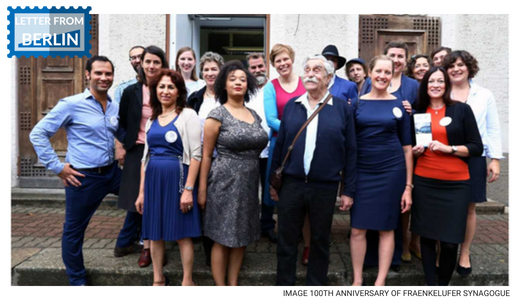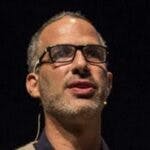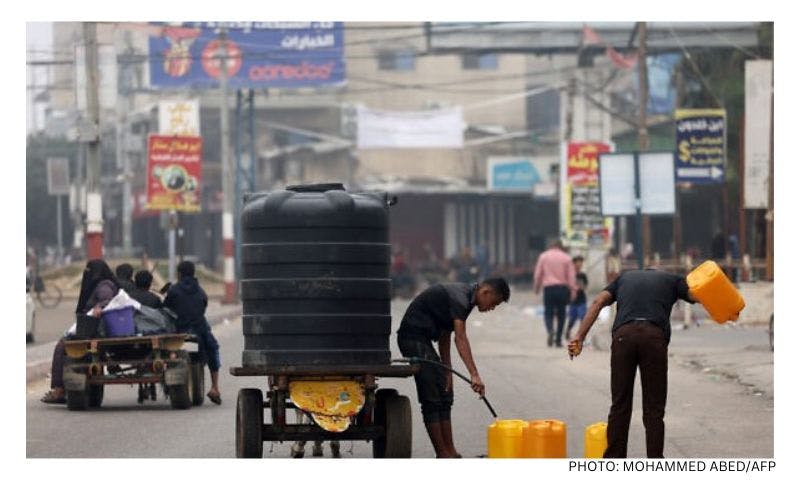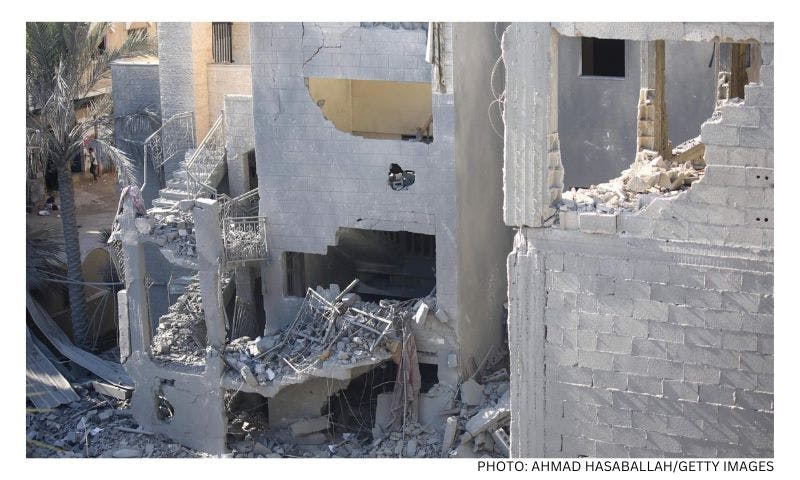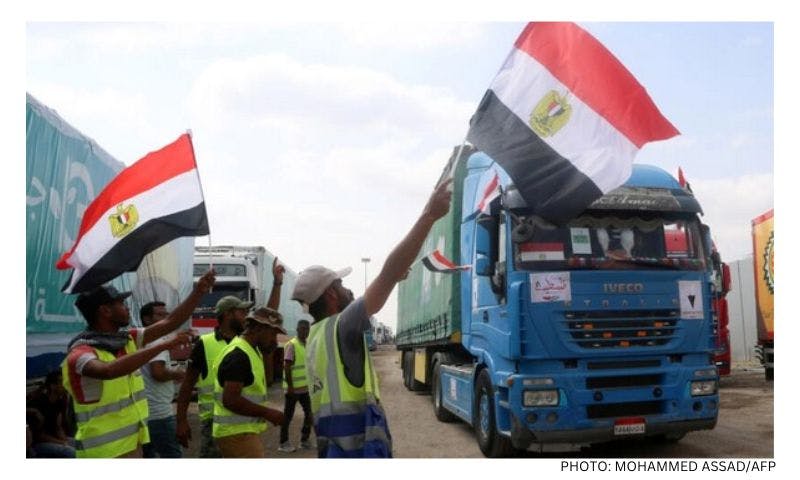Published: 23 August 2018
Last updated: 4 March 2024
When Germany opened its borders to more than a million refugees and asylum seekers from Syria, Afghanistan and Africa, the synagogue reached out to engage with the community of the newcomers. The beating heart behind this outreach program is the power-couple Dekel and Nina Peretz, who have recently celebrated the arrival of their new born baby, Ronja.
Six years ago, Dekel and Nina started working with the synagogue community. At that time, Nina, a German who converted to Judaism, became the first woman on the board. Dekel immigrated from Israel to Berlin 16 years ago. He organises the Shiur, where every Shabbat about 20 to 30 people discuss parts of the Torah, sitting on the floor of the altar – or in the summer sitting under a tent roof in the garden of the synagogue.
I met Dekel and Nina on a sunny Friday noon in a cafe in Weser Street in the Neukölln neighbourhood, with Ronja in the stroller.
Dekel: We used to come occasionally to the synagogue for holidays and Shabbat. Then on Rosh Hashanah in 2012, the wife of our favourite rabbi told us: “You’ve got to do something in the synagogue because if you don’t, the synagogue will close its doors soon.” There weren’t enough congregants and most of the people who were coming were elderly.
Nina: Sometimes even on Shabbat there weren’t enough people to make the “Minyan” (the quorum of ten Jewish adults required for certain religious obligations).
Dekel: So, the same night, we went to friends and one of them had an idea that we start a Friday Kabbalat Shabbat Dinner in the synagogue. Next morning the board agreed. We started to have dinners once a month. The second thing we did was studying the Torah portion together, every Saturday afternoon after we finished praying.
It was important to separate the discussion from the service, so also the less religious ones would come. And it worked. It created a platform for the old and new congregants to discuss deeper philosophical and political questions.
How has the synagogue responded to the immigrant crisis?
Nina: Many people became active to help refugees both in Berlin and all over Germany. We couldn’t sit there and do nothing. First, we decided to collect donations. We were really impressed by how many people brought toys and clothes.
Then in November 2015 we went to a refugee centre in West Berlin. That was the start of one year of activity as volunteers; over 60 people came to help. We provided kitchen services and also arts and sports, and more.
[gallery columns="1" size="large" ids="22217"]
How did Syrian refugees react to your volunteering?
Nina: We didn’t enter the camp with a Jewish flag. Nevertheless, we had the Mitzvah day shirts (for the Jewish day of volunteering). We didn’t walk around there saying “Hey, we are Jews”. But when the subject came up, we didn’t deny it.
Dekel: There were mixed reactions. Many were happy that we came to help putting politics aside. But there was also anti-Israel resentment. But we did not go there to start an educational process. These people just arrived in Germany. We wanted them to know that there were Jews in Germany.
They were in a situation of being weak and we were there to help. We saw the change, especially in their children. When we started, we saw chaotic and scared children who didn’t knew what to do. By the time we ended they were more relaxed and could already speak German. It was very rewarding.
Tell me about your work with Muslim residents in the neighbourhood
Dekel: In our volunteer work it is important for us to help create long term commitment. For this reason, we cooperate with a project called “Schalom Rollberg”. Rollberg is a neighbourhood inside of Neukölln, where a lot of Arab immigrants live.
The project includes school work with the children. By introducing our community to this project, some of us committed to long-term volunteering in which they were giving cooking and art classes on a regular basis. This project is still active today
Nina: We also participate in a project called “days of encounter” – We meet with different communities of Graefe street (In Kreuzberg neighbourhood). every other month and then more intensively in the summer, where we have one week or ten days of encounter.
We visit each other. We make events together. There are a lot of religious communities over there: Christians churches and Muslims initiatives, Muslim school, Islamic foundation and Baha’, a Buddhist centre, etc.
Dekel: We are also working together with a Muslim initiative that is fighting anti-Semitism (called “KIGA”) and they also bring school kids to the synagogue. This is our most important contribution. We have a team of volunteers who, on a regular basis, introduce kindergarten and school children to Judaism.
Many of the visitors are Muslims from the neighbourhood who are very excited about the opportunity to visit a synagogue for the first time. Their strong connection with their religion makes a great bridge for conversation and comparison.
[gallery columns="1" size="large" ids="22218"]
And now you are expanding the Jewish synagogue with the help of Muslims?
The idea arose with the need for a Jewish kindergarten in the area. We have already a lot of young families. We talked with politicians about building a kindergarten on the site of the former main sanctuary. One of them was Raed Saleh from the Social Democrat Party, a Palestinian-born politician who moved to Germany as a child.
Saleh, who had already teamed up with us to support Schalom Rollberg, liked the idea. And because he liked what we were doing, he developed a bigger idea, and called for the reconstruction of the old synagogue that was largely destroyed in Kristallnacht in 1938. His plan has now been supported by the Berlin Senate. This new building will serve to expand our programs and enable us to host our non-Jewish neighbours properly.
Main photo: 100th anniversary of Fraenkelufer Synagogue (Nina is in front second from the right; Dekel is in the middle first from the left )
All photos courtesy of Friends of Fraenkelufer e.V.
